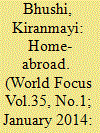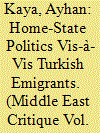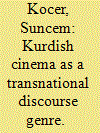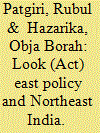| Srl | Item |
| 1 |
ID:
128142


|
|
|
|
|
| Publication |
2014.
|
| Summary/Abstract |
There are various play of forces, institutions and actors that make up the transnational space, which effectively bring home and abroad together in newer ways than before. This paper purports to highlight these aspects of the transnational space. Transnational space and the related terms transnationlism is said to capture a condition in which despite great distances and notwithstanding the pretense to international borders, certain kinds of relationship are globally intensifying and have become denser between places and people.
|
|
|
|
|
|
|
|
|
|
|
|
|
|
|
|
| 2 |
ID:
188176


|
|
|
|
|
| Summary/Abstract |
This article scrutinizes the ways in which Turkish state actors have shaped the social ecosophy of emigrants and their descendants residing in Europe. Describing the Turkish state’s perspectives toward emigrants reveals that Turkish state actors always have instrumentalized emigrants since the beginning of the migratory processes in the 1960s. The focus will be on the current Turkish government’s acts and policies, which are likely to contribute to the Muslimization of Turkey-origin emigrants in diaspora, or in other words, to their labeling simply as ‘Muslims’. Based on a thorough analysis of secondary literature, discourse analyses of contemporary Turkish political leaders’ speeches aimed at Turkish emigrants and their descendants as well as my earlier and ongoing field research findings, I argue that it is the indifference of some European state actors who have not offered political opportunity structures for devout Muslims with Turkish background to be incorporated into the public/political space at the expense of pushing them into the Turkish state actors’ hands that offer alternative political opportunity structures. Hence, the article elaborates the ways in which receiving states’ policies and practices toward migrant-origin people impact diaspora politics of the migrant-sending states. The emphasis is on German and Turkish state actors.
|
|
|
|
|
|
|
|
|
|
|
|
|
|
|
|
| 3 |
ID:
133296


|
|
|
|
|
| Publication |
2014.
|
| Summary/Abstract |
Within the last few years, "Kurdish cinema" has emerged as a unique discursive subject in Turkey. Subsequent to and in line with efforts to unify Kurdish cultural production in diaspora, Kurdish intellectuals have endeavored to define and frame the substance of Kurdish cinema as an orienting framework for the production and reception of films by and about Kurds. In this article, my argument is threefold. First, Kurdish cinema has emerged as a national cinema in transnational space. Second, like all media texts, Kurdish films are nationalized in discourse. Third, the communicative strategies used to nationalize Kurdish cinema must be viewed both in the context of the historical forces of Turkish nationalism and against a backdrop of contemporary politics in Turkey, specifically the Turkish government's discourses and policies related to the Kurds. The empirical data for this article derive from ethnographic research in Turkey and Europe conducted between 2009 and 2012.
|
|
|
|
|
|
|
|
|
|
|
|
|
|
|
|
| 4 |
ID:
190750


|
|
|
|
|
| Summary/Abstract |
The underdevelopment of Northeast India is quite often explained in terms of economic isolation primarily on account of its geographical peripherality. To address this challenge, a new imagination, through the Look (Act) East Policy has been proposed. This approach, makes India’s Northeast the centre of a unified economic, physical and social space through its integration with the trans-border neighbouring regions. In this article, an attempt has been made to examine the logic of developing an ‘extended Northeast’ and how it has been sought to be realized. The article argues that the actualization of this proposed integrated space is ridden with serious difficulties and the internal fragmentation of Northeast India and the exceptional rules and administrative arrangement that are in place in the region along with the geopolitical compulsion of India may act as significant barriers in this regard. And most importantly there are apprehensions that the proposed integrated space may lead to the appropriation of resources of the Northeast by the corporate houses without benefiting the people of the region.
|
|
|
|
|
|
|
|
|
|
|
|
|
|
|
|